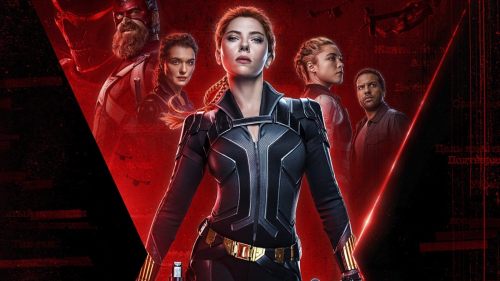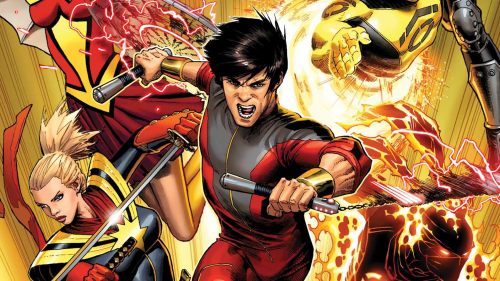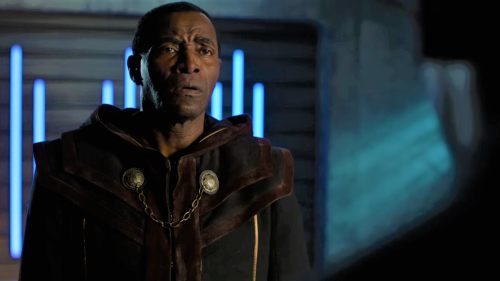Derrickson’s DOCTOR STRANGE: Accepting Death And Magic
We are celebrating this week's Doctor Strange release (get your tickets here!) with a bunch of articles all dedicated to Marvel's Sorcerer Supreme.
If there’s one mantra to be followed when sitting down to watch Marvel’s latest, a Steve Ditko-inspired visual delight, it’s The Ancient One’s advice to Stephen Strange, the brilliant, arrogant eidetiker embodied by Benedict Cumberbatch. “Forget everything you think you know,” and you will be shown something you never thought possible. For Doctor Strange, a western neurosurgeon who spends money faster than he can make it, and who destroys his own hands while in speedy pursuit of glory, what he never thought possible is multitudinous. And like most of our processes and perceptions of reality, it begins with what he sees.
Within the realm of our understanding of visual storytelling, a kaleidoscope applied to an Inception-esque cityscape folding over itself is by no means impossible to imagine, nor are the various neon universes that Strange visits during his training. However, it’s the application of the aforementioned mantra to these visuals that allows for a fuller appreciation of them. As “traditionally” structured genre stories go, the second of Strange’s three acts is dedicated partially to his induction to this world, and yet the focus is rarely on the magical minutiae. Rather than terms, techniques and limitations (think Inception’s own second act), Strange’s training is centered entirely around his character and his approach to learning.
Instead of needing to understand the hows and whys of the kaleidoscopic mirror dimension (Quantum entanglements! A realm between the layers of the multiverse! Or what have you), we’re thrust into this world of bending buildings and psychedelic skylines before we even meet our protagonist. When the time comes for further explanation, it’s denied us in favour of asking us to throw the rules of reality (and thus, visual cinema) out the window, provided we can find that window as it’s hovering somewhere between dimensions. Meredith says her eyes were “dancing around the IMAX screen” as a result of the visuals, an experience I found myself having as well, going so far as to sway my head to keep up with the combination of flying warriors and transforming landscapes moving musically across the screen (and through it – the use of depth here makes the 3D worthwhile), in ways I can’t say I’m accustomed to. It's as if a music visualizer had been programmed to display humanoid forms as I played a Goa Trance album.
The meta-textual acceptance of these magical realms is, of course, merely step one. It opens Strange up to the idea of looking beyond himself, and it re-orients our senses and expectations during this familiar superhero origin story. Don’t let anyone tell you the egotistical Strange is simply an Iron Man retread, though. Tony Stark never learns, but with his photographic memory and desire to excel, learning is Stephen Strange’s entire deal, even if it’s rooted in selfishness. And yet, his excellence is impeded by what he’s learning, or rather, how he’s learning it. Strange seeks knowledge, but what he lacks is wisdom. It’s this wisdom that eventually speaks to his arrogance and his fear of failure, in the form of Tilda Swinton’s Ancient One, and it comes with a thematic unpackaging unlike anything Marvel has done since Guardians of the Galaxy, where Star Lord’s acceptance of his mother’s death allows him to finally reach out to people. Only here, in this film about infinite possibilities, it’s about the acceptance of the only one that’s inevitable: death itself.
Spoilers to follow.
In her moment of death, a singular moment spread out so it can feel infinite, The Ancient One delivers a walloping moment of exposition, coupled with the camera crossing over the pair of them (a moment of realization for Strange, seen through the prism of The Ancient One herself as she crosses over), a lesson made explicit because it needed to be explicit to reach such a pig-headed character: “It isn’t about you.” While an obvious reference to his self-centered nature, the line is preceded by The Ancient One’s long-lasting anxieties surrounding the idea of death, and in her case “long lasting” feels like an understatement. Like those of us forced to come to terms with mortality in our adulthood, she sees the moment of her death as an end-point (she literally sees it), and no matter how she’s been able to influence all possible futures, that one moment in time remains fixed. But in her final moments, as she projects her spirit through a window to catch a glimpse of snowfall, she comes to a realization which she imparts to her pupil. It’s death that makes life worth living. All the beauty and the magic is meaningless without it.
Of course, this moment does slightly fall victim to the film’s penchant for undercutting emotional beats with a joke or a gag, cutting away far too quickly to Rachel McAdams’ reaction to a floating cape. The film is certainly a funny one, earning its laughs for the most part (praise Agamotto, for Beyoncé is now Marvel canon) but its injection of humor is also indiscriminate. In the process, moments like the one immediately following The Ancient One's death, and like Kaecilius espousing his own philosophies on loss and immortality, are prevented from landing completely. As much as “Mister Doctor” elicits a chuckle, I wonder if this tonal plate-spinning comes at the cost of a villain that truly made an impact. Perhaps a necessity, given the studio’s family-friendly branding and its collision with a story that tackles death head on, but it doesn’t certainly prevent any of these ideas from being introduced or woven into the narrative. A superhero “blockbuster” is rarely the place to wax poetic about the nature of life and death, but it does finally bring into view the reasons Scott Derrickson was perfect for the job.
While credit must be given to writers John Spaihts and C. Robert Cargill, who bring mystical ideas to the Marvel universe without reveling in cultural exoticism (for more on its casting issues, allow me to steer you here), it’s Derrickson’s involvement that really catches my eye now that I’ve seen the film. The Exorcism of Emily Rose director has never been shy about his faith and his philosophies (both in his work and via his Twitter presence), and Doctor Strange feels like the kind of film that benefits from a religious or spiritual filmmaker. This is by no means an investigation into Derrickson’s personal life, as the film warrants comparison to no one theology – in fact, it has an almost atheistic view of death as the full stop to life’s run-on sentence. But it’s the sentence itself (where this site places “Movies”) that Derrickson and the Ancient One demand the rules be thrown out the window.
The film is “consciousness expanding” in the most comicbook-y of ways (it really does feel like the arrival of a whole new set of possibilities for Marvel), but it grounds its mysticism in simple ideas of human ego and selflessness. The mystical does not stem from these concepts, but is channeled against and ultimately through them, with Strange learning to let go of the stoic Western knowledge he taught himself, and giving over to Eastern ideas that require an entirely different definition of the self. The breaking down of barriers between “the individual” and the universe, tapping in to something far greater than he knows. “It’s not about you” was never just a reference to shedding his ego, but also to the realization of all that he’s connected to. Events, people and possibilities, all the magics that make death seem limp in comparison.
It’s this conquering of death through selflessness that allows him to bargain with the demonic Dormammu, dying many times over, and willing to do so many times more. His final act before leaving the realms bound by time is to undo all of Kaecilius’ death and destruction, a very sly and very literal reversal of Marvel’s third act set pieces. For Strange isn’t a destroyer or a warmonger, but a healer. He does not know for sure that his plan will work (he’s no Captain Kirk in Star Trek V!), but as he enters the Dark Dimension, ready to die repeatedly for all eternity, he does so having done things that would give his death meaning. Not only has he made up for some of the hurt he’s caused, apologizing to Christine and handing his scalpel over to Dr. West, he’s saved lives, really saved them, and not for his own glory. Dormammu, who has conquered death, isn’t bound by time. But while time’s biggest hurdle is that it makes death inevitable, Strange conquers time by accepting that inevitability.
Doctor Strange may wield the Time Stone, but he truly makes time his ally when he accepts the nature of death. Once a man who refused his calling for fear of failure, he’s now ready to fail for all eternity until he’s able to succeed.
It would not surprise me if, in his future appearances, we see Stephen Strange living life. Not in the fast lane, but rather, to the fullest.



